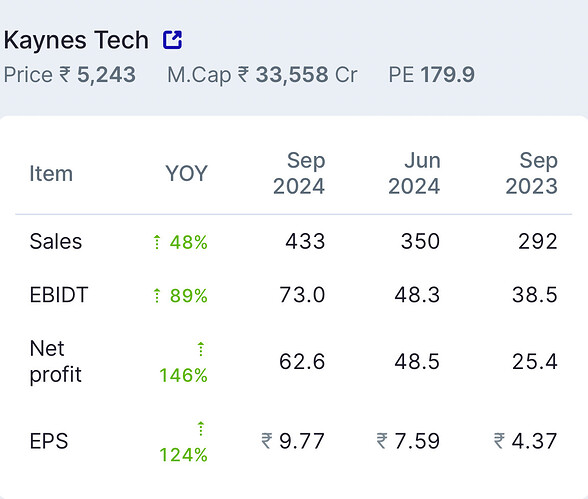About Kaynes Technology India Limited
Kaynes Technology India Limited is a leading player in the electronics manufacturing services (EMS) industry in India. Established in 2008, the company specializes in providing end-to-end solutions for electronic manufacturing, including design, assembly, testing, and logistics. Kaynes serves various sectors, including automotive, industrial, aerospace, and telecommunications, with a comprehensive product portfolio that encompasses over 300 electronic products. The company is recognized for its commitment to quality, innovation, and customer satisfaction, and it has established a strong presence in both domestic and international markets.
Business Verticals:
OEM - Turnkey - Box Build (39%): Specializes in delivering ‘Build To Print’ or ‘Build to Specialization’ services, catering to diverse industry verticals from complex box builds to sub-systems.
OEM - Turnkey Solutions - Printed Circuit Board Assemblies (PCBAs) (56%): Encompasses PCBAs, cable harnesses, magnetics, and plastics, ensuring seamless manufacturing from prototyping to mass production.
Original Design Manufacturing (ODM) (2%): Offers solutions such as smart metering, smart street lighting, BLDC technology, and IoT solutions.
Product Design & Engineering (3%): Provides engineering services including embedded design, firmware and software development, and mechanical design.
Order Book: As of January 2024, the order book stands at ₹3,789 crore, up from ₹3,000 crore in June 2023, with an average order value increasing to ₹9.1 million in Q3 FY24 compared to ₹5.5 million in FY21.
Customer Base: Notable clients include Siemens, Hitachi, IJL, Agappe, Tonbo Imaging, and Iskraemeco, among others.
Manufacturing Facilities: Kaynes operates 14 manufacturing facilities across various states in India, equipped with 18 SMT lines, 70 THD lines, 26 cable harness lines, and 15 plastic molding machines.
Expansion Plans: The company is setting up a new manufacturing facility in Karnataka and expanding existing facilities in Mysore and Manesar, as well as establishing an OSAT facility in Telangana. Kaynes has signed MoUs with the Governments of Telangana and Karnataka for investments totaling ₹6,550 crore to develop OSAT and PCB facilities.
Acquisition: In December 2023, Kaynes acquired 100% of Digicom Electronics Inc. (USA) for USD 2.5 million, enhancing its electronics manufacturing capabilities.
Fund Raising via QIP: In December 2023, the board approved the allotment of 57,75,577 equity shares at ₹2,424 per share, aggregating to ₹1,400 crore.
Business Strategy:
Kaynes Technology’s business strategy revolves around innovation, quality, and expansion. Key elements include:
Focus on High-Value Markets: Targeting industries like automotive and aerospace, which demand high reliability and quality in electronic component.
R&D and Innovation: Investing in research and development to innovate and enhance product offerings, staying ahead of technological advancements.
Geographic Expansion: Exploring opportunities to expand into international markets, thereby increasing revenue streams and reducing dependence on the domestic market.
Strategic Partnerships: Collaborating with key players in various sectors to strengthen its market position and enhance product capabilities.
Sustainability Initiatives: Committing to sustainable practices in manufacturing to meet global standards and customer expectations.
Business Model:
Kaynes Technology operates a business model characterized by:
Electronics Manufacturing Services (EMS): Providing a range of services from design to manufacturing and after-sales support.
Customized Solutions: Tailoring products to meet specific client needs, which helps in building long-term client relationships.
Lean Manufacturing Practices: Implementing efficient production processes to minimize waste and reduce costs while maintaining quality standards.
Board of Directors:
Key leadership includes:
K. S. Kumar (CEO): Leading the company with a vision for growth and innovation.
R. B. Shenoy (CFO): Responsible for financial strategy and management.
V. P. Nair (COO): Overseeing operations and ensuring efficiency across manufacturing processes.
Dr. Anil Gupta (Board Director): Providing expertise in technology and strategic decision-making.
Shareholding Pattern (as of September 2024):
Promoter and Promoter Group: 60.15%
Foreign Institutional Investors (FIIs): 12.00%
Domestic Institutional Investors (DIIs): 15.50%
Public Shareholding: 12.35%
Strengths:
Market Position: Established reputation in the EMS sector, with a strong focus on high-value markets.
Diverse Client Base: Serves various industries, reducing dependence on any single sector.
Robust R&D Capabilities: Continuous innovation drives product development and keeps the company competitive.
Quality Assurance: Strong emphasis on quality and reliability enhances customer trust and loyalty.
Efficient Manufacturing: Implementation of lean manufacturing practices leads to cost-effective production.
Weaknesses:
Dependence on Key Clients: Reliance on a few major clients can pose risks if contracts are lost or reduced.
Market Volatility: Fluctuations in demand in key sectors can impact revenue stability.
Limited Global Presence: While expanding, Kaynes still relies heavily on the domestic market, which may limit growth potential.
Supply Chain Risks: Global supply chain disruptions can affect manufacturing and delivery timelines.
Opportunities:
Growing EMS Market: Increasing demand for electronic components and manufacturing services presents significant growth opportunities.
International Expansion: Exploring new markets can diversify revenue streams and reduce risks associated with domestic dependence.
Emerging Technologies: Opportunities in sectors like IoT, AI, and automation could lead to new product development and revenue growth.
Threats:
Intense Competition: The EMS industry is highly competitive, with numerous players vying for market share.
Economic Downturns: Economic slowdowns can negatively impact demand for electronic products and services.
Technological Advancements: Rapid technological changes require continuous adaptation and investment in R&D.
Disc- Invested 7% of my portfolio



